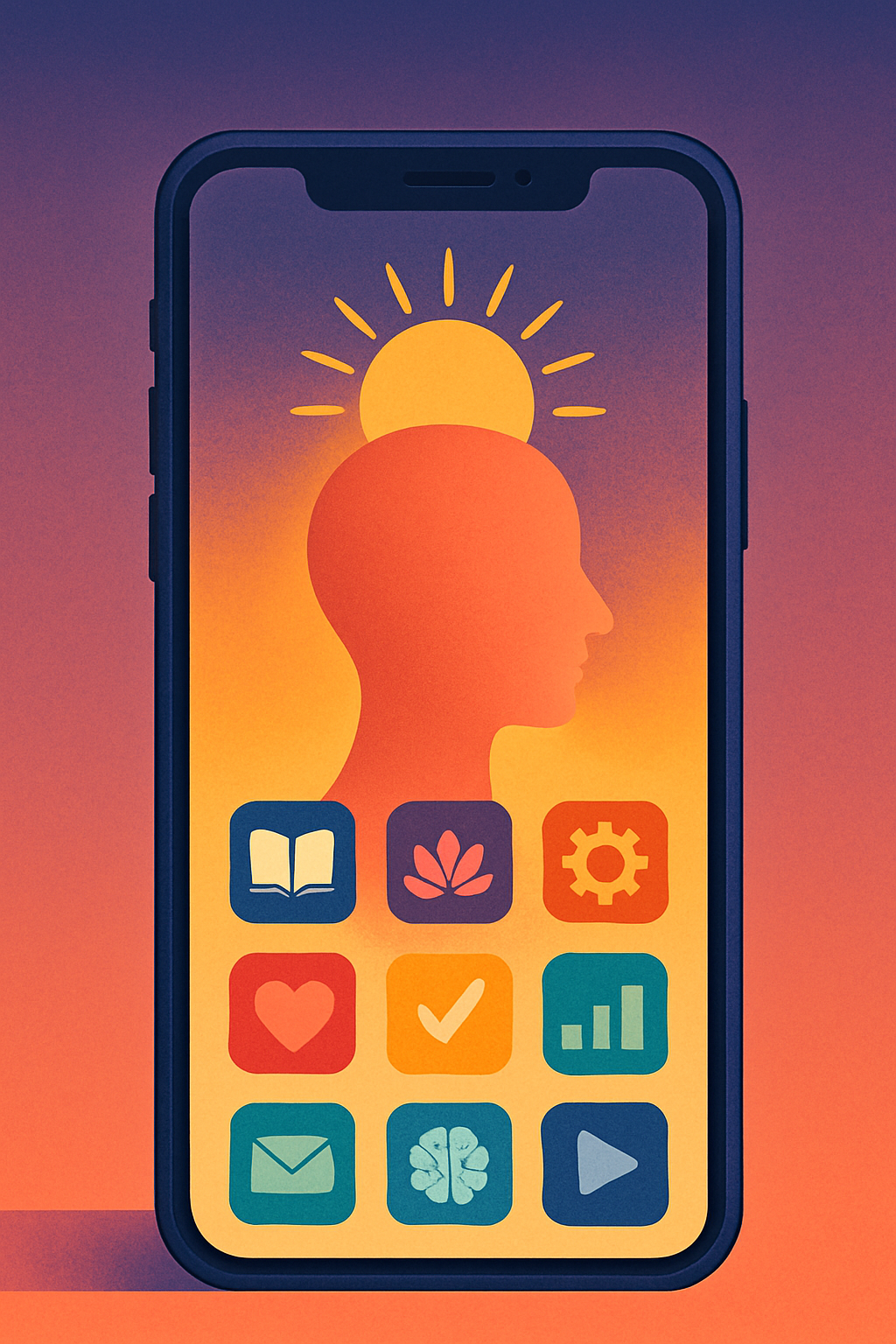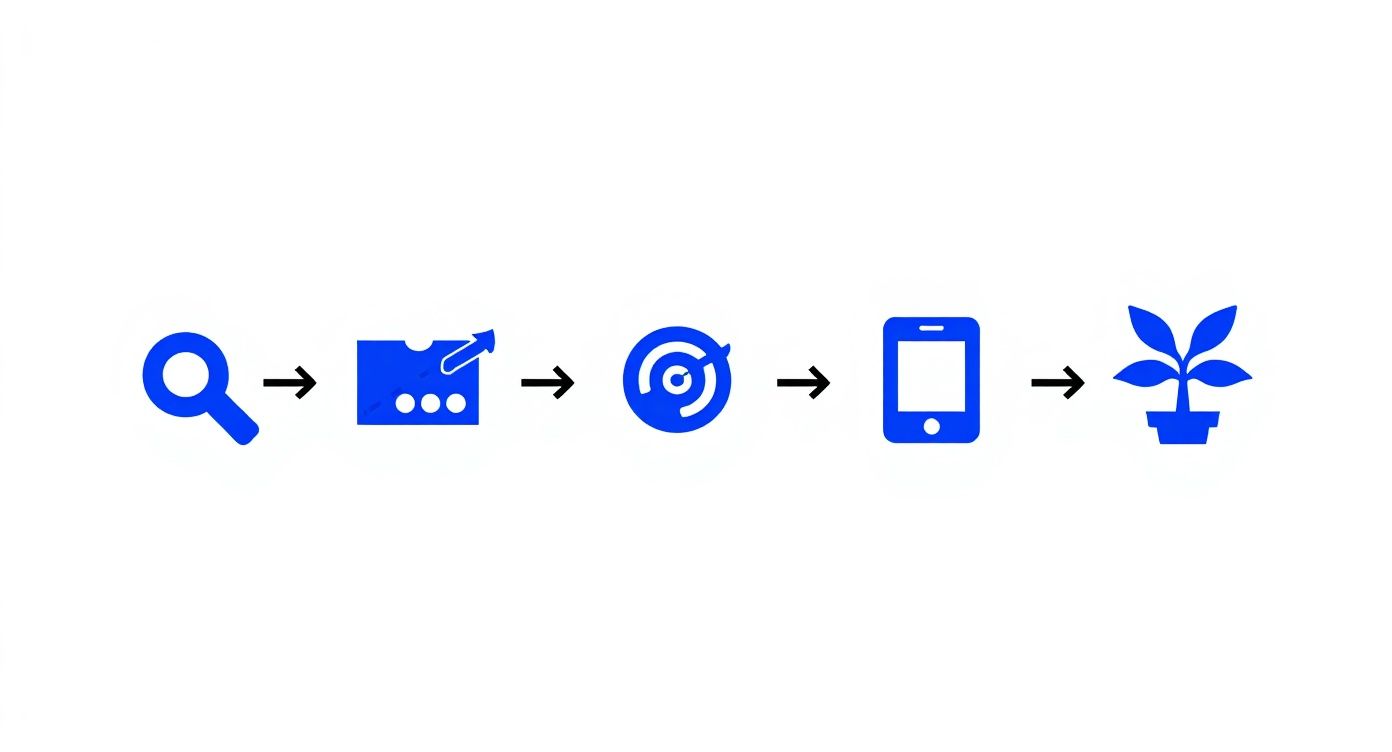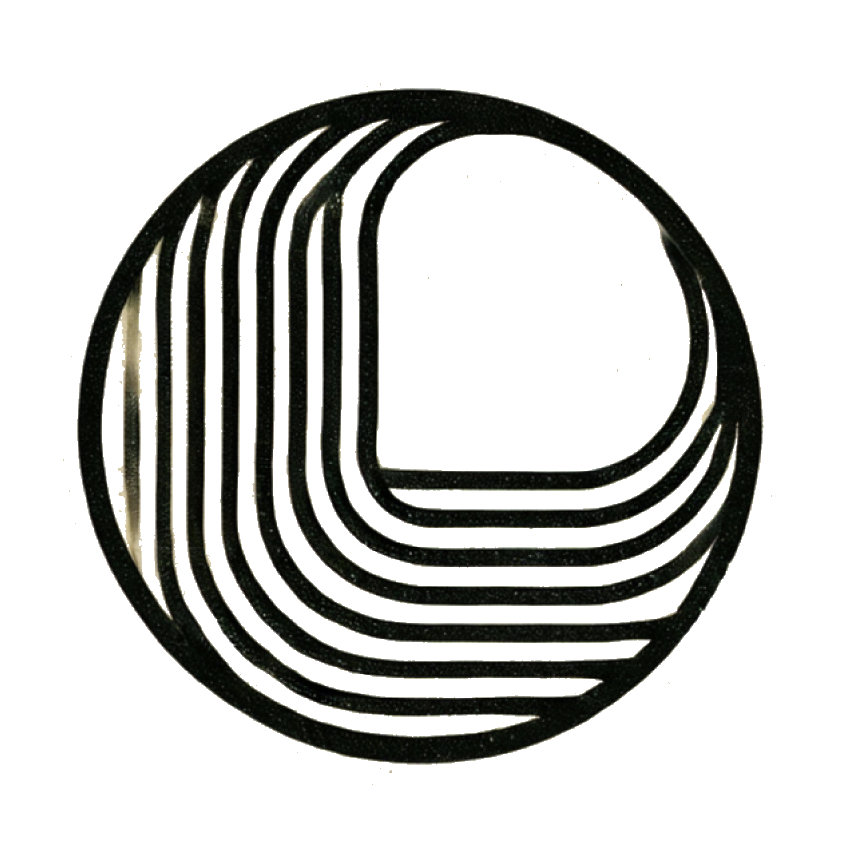Best Self Improvement Apps & Brain Training Apps 2026 Guide
In 2026, the right personal growth app isn’t just a fancy to-do list; it’s a dedicated tool for genuine self-improvement. Think of apps like Life Note for AI-guided journaling, Calm for structured meditation, or Streaks for building better habits.

📌 TL;DR — Best Personal Growth Apps 2026
Top personal growth apps by category: Life Note (AI journaling), Headspace (meditation), Habitica (habit tracking), Blinkist (learning). Key criteria: evidence-based features, privacy, and sustainable engagement (not addictive notifications). The best app is the one you'll actually use consistently. For structured growth, try a guided journal.
(Related: AI apps designed specifically for students)
The right personal growth app isn’t just a fancy to-do list; it’s a dedicated tool for genuine self-improvement training programs. Think of apps like Life Note for AI-guided journaling, Calm for structured meditation, or Streaks for building better habits. These aren’t just about managing tasks—they provide clear, focused problem solving pathways for self-discovery, mindfulness, and real skill development. Not sure if you need an app or a human? Read our guide on whether you need a personal growth coach. This guide, written from my experience coaching individuals through digital wellness, will show you how to find the right tool for you.
Your Guide to Digital Self-Improvement
The best personal growth apps in 2026 combine AI-powered journaling, guided meditation, and habit tracking to deliver measurable self-improvement results.
Last verified: March 2026. Pricing, features, and rankings reflect our latest testing.
Let’s be honest: wading through the app store looking for a "personal growth" tool can feel like a chore. Thousands of apps promise to make you more productive, more mindful, or a better version of yourself. It's noisy and overwhelming.
As of March 2026, this guide is here to cut through that noise. We'll give you a simple framework for finding the tools that will actually stick and make a difference. We’re going beyond basic feature lists to offer a real look at what makes each type of app work, so you can choose what fits your life.
This flood of apps isn't random; it reflects a massive cultural shift. The personal development market is exploding. In fact, health and fitness apps alone are projected to rake in over $4 billion in global in-app purchase revenue in 2026. That’s more than 100% growth in just five years, which shows just how deeply these tools are becoming part of our daily wellness routines. If you're curious about the numbers, SensorTower’s analysis on mobile health and fitness trends offers a great deep dive.
Comparing Digital Growth Tools
Here’s the thing: not all self-improvement apps are built the same. They work off different psychological models and are designed to solve very different problems. Getting a handle on these core differences is the first step to finding something you’ll actually use. And as you look around, it's good to know there are some excellent free options out there, including some of the best free mental health apps, brain training apps, and brain games for cognitive skills that offer incredible value.
To make things easier, we can break down these apps into a few main categories based on what they do and how they do it.
App categories as of March 2026:
| App Category | Primary Focus | Ideal For | Core Mechanism |
|---|---|---|---|
| Journaling & Reflection | Building self-awareness and processing thoughts. | Individuals seeking clarity and emotional insight. | Cognitive Behavioral Therapy (CBT) & Narrative Therapy |
| Meditation & Mindfulness | Reducing stress and improving mental focus. | Anyone looking to manage anxiety or be more present. | Mindfulness-Based Stress Reduction (MBSR) |
| Habit Tracking | Building consistency and creating new routines. | Goal-oriented users who thrive on structure. | Atomic Habits & Behavioral Reinforcement |
| Learning & Skill Building | Acquiring new knowledge and practical skills. | Lifelong learners aiming for professional or personal mastery. | Microlearning & Spaced Repetition |
How to Choose the Right Personal Growth App
Choose a personal growth app by matching it to your specific goals — journaling, meditation, therapy, or habit tracking — and committing to consistent daily use.
With thousands of apps all promising to change your life, picking the right one can feel completely overwhelming. Before you even open the app store, it’s worth creating a simple framework to guide your decision. The best app isn't about flashy features; it's the one that aligns with your goals, respects your privacy, and actually fits into your daily life.
Taking a moment to think through what you really need will save you a ton of time and help you find a tool that genuinely sticks. Think of it like a simple path: figure out your goal first, then find the app that gets you there.

This process makes one thing clear: a good choice starts with you—defining what you want to achieve—long before you hit "download."
The Core Criteria for Picking a Winner
To choose with confidence, run any potential app through a few key filters. These are the things that separate a trusted companion from just another icon collecting digital dust on your phone.
- User Experience (UX) and Interface (UI): Is the app actually pleasant to use? A clean, intuitive design removes friction and makes it far easier to build a daily habit. If an app feels like a chore, you won't use it. Simple as that.
- Personalization and Adaptability: Does the app grow with you? A one-size-fits-all approach is a recipe for failure in personal development. Look for apps that tailor content, reminders, and insights based on your progress and shifting goals.
- Scientific Foundation: Are the methods backed by real evidence? Many of the most effective apps are built on proven frameworks like Cognitive Behavioral Therapy (CBT), positive psychology, or mindfulness. An evidence-based approach adds a layer of credibility and makes it more likely you'll see real results.
- Habit Integration: How easily does it slide into your existing routine? The goal is to integrate, not disrupt. Features like smart reminders, home screen widgets, and quick, bite-sized sessions can make all the difference for long-term consistency.
This deliberate approach matters more than ever. With around 80% of Americans actively pursuing self-improvement, the demand for effective digital tools has exploded. This makes it crucial to sort the apps offering genuine value from those just jumping on a trend.
Don't Skip the Fine Print: Data Privacy and Security
This might be the most important—and most overlooked—factor of all. When you use a personal growth app, you’re sharing your private thoughts, fears, and ambitions. That's incredibly sensitive stuff.
Your reflections, struggles, and aspirations are sensitive data. It is absolutely essential to choose an app that treats your privacy as a fundamental right, not an afterthought.
Before you download anything, read the privacy policy. I mean really read it. Understand your strengths and weaknesses, what data they collect, how they use it, and if they share it. Look for apps that offer end-to-end encryption, which ensures only you can ever access your entries. For instance, understanding how Life Note protects your privacy with AES-GCM encryption sets a high bar for what you should expect from any secure tool.
Choosing an app with a strong, transparent privacy policy means you can be fully honest with yourself, which is the whole point of this journey. For those looking for tools on specific platforms, many of the best productivity apps for Mac also prioritize robust security features.
Comparing Different Personal Growth App Categories
Personal growth apps fall into four main categories — journaling, meditation, therapy, and habit tracking — each targeting different aspects of self-improvement.

The world of personal growth apps is massive, and frankly, it can be overwhelming. The key isn't finding the single "best" app—it's about matching the right type of tool to the growth you're chasing right now.
Each category is built on a different psychological engine. A habit tracker with progress tracking runs on behavioral reinforcement to make new habits and routines stick. A meditation app uses mindfulness to dial down the noise in your head. Picking the right one means choosing a tool that works with your brain, not against it.
Let's break them down.
Journaling and Self-Reflection Apps
At their heart, journaling apps are about building self-awareness. They give you a private, structured space to untangle your thoughts, make sense of your emotions, and spot the patterns running your life. This is the place to start if you're seeking clarity, navigating a big life change, or just want to feel more connected to yourself.
The magic here is a simplified form of narrative therapy—getting thoughts out of your head and onto the page gives you the distance needed to actually see them clearly. You separate yourself from your feelings just enough to analyze them.
Newer tools are taking this a step further. The emerging field of AI journaling uses smart prompts and guided reflections to help you dig deeper and uncover connections you might have otherwise missed. The only catch? It demands your active participation. If you aren’t willing to spend a few minutes looking inward, you won’t get much out of it.
Meditation and Mindfulness Apps
Meditation and mindfulness apps are your training ground for attention and awareness. The goal is simple: achieve a state of calm and mental clarity. They exist to reduce stress, sharpen focus, and help you get a handle on your emotional reactions. If you're feeling frazzled or overwhelmed, this is your category.
These tools are grounded in the principles of Mindfulness-Based Stress Reduction (MBSR), a heavily researched method for managing stress. Through personalized coaching via guided meditations, memory attention exercises, breathing exercises, and soundscapes, they teach you how to observe your thoughts without getting swept away by them.
The biggest win for mindfulness apps is their accessibility. They've opened the door to practices that used to feel intimidating for beginners, making mental wellness a real possibility for millions.
But there’s a pitfall: it’s easy to become a passive listener. Just hitting play on a guided session without actively engaging your mind can seriously limit the long-term benefits.
Habit Tracking Apps
Habit trackers are all about one thing: building consistency. They're designed for goal-oriented people who get a kick out of structure, data, and seeing their progress stacked up visually. Want to work out every day? Read more? Drink enough water? These apps provide the framework to make it happen.
The core engine is behavioral reinforcement, often drawing from ideas in books like Atomic Habits. By tracking your "streaks" and celebrating small victories, the app creates a positive feedback loop that keeps you going. That little dopamine hit you get from checking a box is a powerful motivator.
The main limitation is that these apps are great at tracking the "what" but terrible at explaining the "why." A habit tracker will tell you if you did something, but it won’t help you understand the resistance or motivation behind it.
Learning and Skill Platforms
Learning platforms are your digital library for acquiring new knowledge or mastering a specific skill. Think book summary apps like Headway or online course platforms like Masterclass. They’re built for the lifelong learner who is always looking to level up, whether for their career or just for personal satisfaction.
These tools often rely on methods like microlearning and spaced repetition. They slice complex subjects into small, digestible lessons, making it easy to learn on the go and actually remember what you learned.
The challenge? Turning knowledge into action. It’s easy to get stuck in consumption mode, creating the illusion of progress. Real growth only kicks in when you take what you've learned and apply it in the real world.
To make the choice clearer, this table cuts straight to the chase, outlining what each category does best and for whom.
Personal Growth App Category Comparison
| App Category | Primary Goal | Ideal User Profile | Underlying Principle | Potential Pitfall |
|---|---|---|---|---|
| Journaling & Reflection | Increase self-awareness and process emotions. | The introspective individual seeking clarity and emotional insight. | Narrative Therapy & CBT | Requires consistent, active self-reflection to be effective. |
| Meditation & Mindfulness | Reduce stress and improve mental focus. | The busy individual managing anxiety or seeking calm. | Mindfulness-Based Stress Reduction (MBSR) | Can become a passive listening experience without active engagement. |
| Habit Tracking | Build new routines and maintain consistency. | The goal-oriented person who thrives on structure and data. | Behavioral Reinforcement | Focuses on completion metrics, not the motivation behind them. |
| Learning & Skill Building | Acquire new knowledge and practical abilities. | The lifelong learner aiming for professional or personal mastery. | Microlearning & Spaced Repetition | Risk of passive consumption without practical application. |
As you can see, the "best" app really depends on whether your goal is to understand your mind, calm it, change your actions, or expand your knowledge. Choose the tool that targets the area you want to grow in today.
Top Apps for Journaling and Self-Reflection
The top journaling apps go beyond blank pages, offering AI-guided prompts and reflective frameworks that deepen self-awareness and uncover behavioral patterns.
Journaling isn't just about recording what happened today; it’s about building a relationship with yourself. It's a foundational practice for anyone serious about personal growth. In that quiet space, you can finally process emotions, spot hidden behavioral patterns, and cultivate a deeper self-awareness.
The best apps for this don't just hand you a blank page. They offer structure and guidance, helping you explore your inner world in a way that feels productive, not overwhelming. For a framework on using AI as your life coach, see our practical guide.

These digital tools can turn reflection from a daunting chore into an accessible daily ritual. For example, trying to navigate a big career change becomes a process of articulating fears and mapping out aspirations. Processing a tough breakup becomes a structured, healing exercise for better processing speed instead of a chaotic internal monologue.
The secret is finding the right app that fits your introspective style.
Life Note: The AI Journaling Companion
Life Note completely reimagines journaling as a dynamic conversation. Instead of just writing into a void, you're actually engaging with AI mentors modeled on thinkers like Carl Jung or Brené Brown. This unique setup turns self-reflection into an interactive dialogue, helping you see your own challenges from entirely new angles.
The app’s real power is its ability to provide personalized, insightful feedback. If you're wrestling with self-doubt, a mentor might serve up prompts based on stoic philosophy or positive psychology, guiding you toward a breakthrough. Its smart memory feature is also brilliant—it spots recurring themes in your entries over time, helping you connect the dots in your own story. Explore the deeper roots in our guide on Stoicism, Christianity, and Buddhism.
- Best For: Anyone looking for guided, interactive reflection to better understand their emotional patterns. It’s perfect for people who want more than a blank slate and crave thoughtful, AI-driven feedback to push their growth forward.
- Key Differentiator: The "mentor" system. It offers wisdom and perspective tailored to your specific entries, creating a responsive experience you won't find anywhere else.
Day One: The Digital Scrapbook
Day One is a classic for good reason. It’s less of a journal and more of a rich, multimedia scrapbook of your life. You can add photos, locations, weather data, and even audio clips to your entries, building a vivid and detailed timeline of your experiences.
Its clean, elegant interface makes daily logging feel effortless. The "On This Day" feature is especially powerful, letting you look back at past entries to see just how far you've come. This focus on memory and milestone tracking makes it an incredible tool for appreciating the journey and recognizing long-term progress. If you're just starting out, our ultimate guide to journaling can help you build a solid habit.
- Best For: Memory keepers and anyone who wants to create a beautiful, multimedia log of their life. It’s ideal for those who value aesthetics and enjoy capturing moments in multiple formats.
- Key Differentiator: Its deep multimedia integration and the "On This Day" feature give you a powerful way to catalog memories and visualize your personal history.
Stoic: The Mindfulness Journal
Stoic mixes journaling with mindfulness exercises and ancient philosophical principles. It’s designed to help you build emotional resilience by prompting you to reflect on Stoic virtues like wisdom, courage, and justice. The app guides you through morning and evening routines that encourage you to prepare for the day ahead and reflect on the one that's passed.
Stoic's true value is in its structure. It doesn’t just ask "How are you feeling?"—it provides a philosophical framework to help you interpret and manage those feelings constructively.
This structured approach is a godsend for anyone who feels overwhelmed by open-ended journaling. By focusing on specific prompts and exercises, Stoic provides a clear path toward developing a more mindful and resilient mindset. It’s less about chronicling events and more about training your mind.
- Best For: Anyone looking to build mental toughness and emotional regulation. It's particularly useful for those interested in practical philosophy and structured, guided reflection.
- Key Differentiator: Its integration of Stoic philosophy into daily prompts provides a unique and actionable framework for building real-world resilience.
Best Apps for Meditation and Mindfulness
Leading meditation apps like Headspace and Calm translate mindfulness into guided daily exercises that reduce stress, sharpen focus, and build lasting inner calm.
For millions, meditation and mindfulness apps have become the front door to personal growth. They offer a pocket-sized sanctuary to dial down stress, sharpen focus, and find a bit of inner peace. These tools have successfully translated abstract ideas like “being present” into simple, guided exercises you can do literally anywhere.
And their popularity is no fluke—it reflects a massive cultural shift toward accessible mental wellness.
The numbers are staggering. People spend 88% of all their mobile time inside apps, and when it comes to self-improvement, 70% of users are reaching for mindfulness and meditation tools first. It's the biggest slice of the pie for a reason. The runaway success of apps like Calm, which was pulling in around eight million US dollars a month as of January 2026, proves just how essential these tools have become. You can dig into more of these powerful app market statistics on Buildfire.com.
At their core, these apps make ancient practices feel modern and approachable. They guide you through everything from basic breathing exercises to multi-day courses on rewiring anxiety or finally getting a good night's sleep.
This screenshot from Calm's website captures its whole vibe. The serene, immersive design is meant to instantly bring your cortisol levels down. The natural landscapes and soft colors aren't just for show; they're a key part of the experience, helping you disconnect from the day's chaos before you even press play.
Calm: For Guided Immersion and Sleep
Think of Calm as a massive, cozy library for your mind. Its real power is in the sheer breadth of its content, which goes way beyond just sitting and breathing. It’s most famous for its "Sleep Stories"—soothing bedtime tales often read by celebrities, engineered to help you drift off. But you'll also find a deep well of guided meditations, ambient music, and even video lessons on mindful movement.
This all-encompassing, sensory-rich approach makes Calm perfect for anyone who feels a little intimidated by the idea of silent meditation. It eases you into a state of relaxation rather than demanding it.
If your main goals are taming stress, managing anxiety, and—most importantly—fixing your sleep, Calm’s library is practically guaranteed to have something for you.
- Best For: Beginners looking for a gentle on-ramp to mindfulness and anyone who wants to prioritize better sleep and deep relaxation.
- Key Differentiator: The "Sleep Stories" are a game-changer. It's a unique and wildly effective feature that sets it far apart from more traditional meditation apps.
Headspace: For Structured Skill-Building
Headspace comes at mindfulness from a different angle. It treats meditation less like a relaxation hack and more like a skill you can build, one day at a time. The entire app is built around foundational courses that teach you the "what" and "why" of mindfulness in a clean, step-by-step format. It feels like you're actually progressing through a curriculum.
Its signature style—clean, playful, and full of quirky animations—is fantastic for breaking down complex ideas into bite-sized, understandable lessons. This makes Headspace a natural fit for analytical thinkers who want to understand the mechanics behind the practice, not just feel its effects. It’s less about instant calm and more about building a sustainable, long-term habit. For the underlying science, read about the 4 laws of behavior change.
Headspace is brilliant at demystifying meditation. It’s like having a friendly, patient teacher in your pocket, guiding you from basic breathing techniques to more advanced practices for focus, compassion, and resilience.
If you're a goal-oriented person who thrives on structure and wants to build a deep, lasting mindfulness practice from the ground up, the methodical approach of Headspace will probably click with you instantly.
- Best For: Beginners and intermediates who prefer a structured, skill-based path for building a consistent meditation practice.
- Key Differentiator: Its curriculum-based system, especially the foundational courses that systematically build your meditation skills over time.
Weaving a New App Into Your Daily Routine
The key to making any growth app stick is habit stacking — anchoring it to an existing daily routine so it becomes automatic, not another chore.
Picking out a great personal growth app is the easy part. The real work—and where all the value is hidden—is turning it into a consistent, daily practice. An app's potential stays locked away until you use it regularly, transforming it from a cool new download into a genuine tool for change.
The secret isn’t about white-knuckling it with willpower. It's about smart integration. You need to weave the app into the fabric of your existing day, so using it feels as natural as making coffee, not like another chore on your to-do list. It’s about building a system that actually fits your life.

Start Small, Build Momentum
The biggest mistake people make? Trying to do way too much, way too soon. Committing to a 30-minute meditation or an hour-long journaling session on day one is a surefire recipe for burnout. Instead, start with a goal so small it feels almost ridiculous not to do it.
- Journaling: Just write one sentence a day. That's it.
- Meditation: Meditate for only two minutes.
- Habit Tracking: Pick one simple habit to track, nothing more.
This is often called the "two-minute rule," and it's brilliant because it removes all the initial friction. Once the action becomes automatic, you can gradually extend the time. The goal here is to build the habit first, then worry about optimizing it later.
"The most effective way to change your habits is to focus not on what you want to achieve, but on who you wish to become."
— James Clear, Atomic Habits
This insight is key. You're not just ticking a box; you're slowly building an identity as someone who prioritizes reflection or mindfulness.
Master the Art of Habit Stacking
One of the most powerful ways to lock in a new behavior is a technique called habit stacking. The idea is to piggyback your new desired habit onto an existing one you already do on autopilot. The formula couldn't be simpler: "After I [current habit], I will [new habit]."
This clever trick uses the momentum from an established routine to pull you right into the new one. No need for motivation or memory.
Here’s what that looks like in the real world:
- Morning Routine: "After I pour my first cup of coffee, I will open my journaling app for five minutes."
- Commute: "After I sit down on the train for my commute, I will do a 10-minute guided meditation."
- Evening Wind-Down: "After I brush my teeth at night, I will open my habit tracker to review my day."
By anchoring the app to something you already do without thinking, you stop relying on reminders and start building a truly durable, automatic routine.
Frequently Asked Questions
Most people wonder whether to pay for a growth app, how long before seeing results, and whether one app can replace therapy — here are direct answers.
Should I Go with a Free or Paid App?
My advice? Always start with the free version or a trial period. This is your chance to test-drive the app, see if its core features actually help you, and decide if you even like using it. Free apps are perfect for simple tasks, like a basic habit tracker or a few introductory meditations.
But when you're ready to get serious, a paid app is often the way to go. You’re not just paying to remove ads; you’re investing in deeper, evidence-based content, smarter personalization, and features that genuinely accelerate your growth. If you’re committed to a specific goal—like completing a full meditation course or using an AI journaling mentor—the premium features are almost always worth it.
Can I Use More Than One App at Once?
Yes, but be smart about it. The most effective approach is to pair apps from different categories that serve completely different needs. This way, you avoid feature overlap and the dreaded "app fatigue."
For example, you could use a journaling app like Life Note for your daily reflection and a meditation app like Calm to manage stress. Each tool has a clear, distinct purpose in your routine, so they complement each other instead of competing for your attention.
The key is to start with one core app. Build a solid habit around it first. Only then should you consider adding another app, and only if it targets a totally different area of your growth journey.
What’s the Real Secret to Long-Term Success?
It boils down to one word: consistency. The fanciest, most feature-packed app is completely useless if it just sits on your phone unopened. The best app for you is the one you'll actually use day in and day out.
When you're choosing, put the user experience first. Pick an app with an interface you enjoy and that aligns with what you want to achieve. Most importantly, it has to slide into your existing daily routine without friction. An app with fewer features that you use daily will deliver a thousand times more value than a complex one you only remember to open once a month.
Build the habit first. The results will follow.
Final Thoughts
The right personal growth app matches your specific goals and fits naturally into your daily life — start with one tool and build consistency before adding more.
Choosing the best app for personal growth is a deeply personal decision. The right tool isn't the one with the most downloads, but the one that aligns with your specific goals—whether that's gaining self-awareness, reducing stress, or building better habits. By focusing on your core needs and weaving the app into your daily life using strategies like habit stacking, you can transform a simple download into a powerful catalyst for change.
The journey starts with a single step. For those looking to deepen their self-understanding, exploring a new approach to journaling can be a profound starting point.
Ready to turn reflection into your most powerful tool for growth? With Life Note, you can journal with AI mentors modeled on the world's greatest minds, uncover deep insights about yourself, and build a more purposeful life. Start your journey of self-discovery today at https://www.mylifenote.ai.
📖 Recommended: Pair these apps with the best self-help books for men for a complete personal growth toolkit.
Looking for structured self-authoring? Learn about Jordan Peterson's Self-Authoring program and free alternatives like Life Note.
Looking for thoughtful presents that support someone's growth journey? Browse our top 25 self-care gift ideas.
For a deeper look at AI-specific tools, see our roundup of the 10 best AI tools for self-improvement in 2026.
If you're focused on structured learning, check out our guide to the best online resources for continuing adult education.
Beyond apps, there are many valuable online resources for growth — explore our guide to the best online resources for personal growth and self-improvement.
Want to go beyond apps? Explore how working with a personal growth coaching can accelerate your self-development journey.
Journal with 1,000+ of History's Greatest Minds
Marcus Aurelius, Maya Angelou, Carl Jung — real wisdom from real thinkers, not internet summaries. A licensed psychotherapist called it "life-changing."
Try Life Note Free

